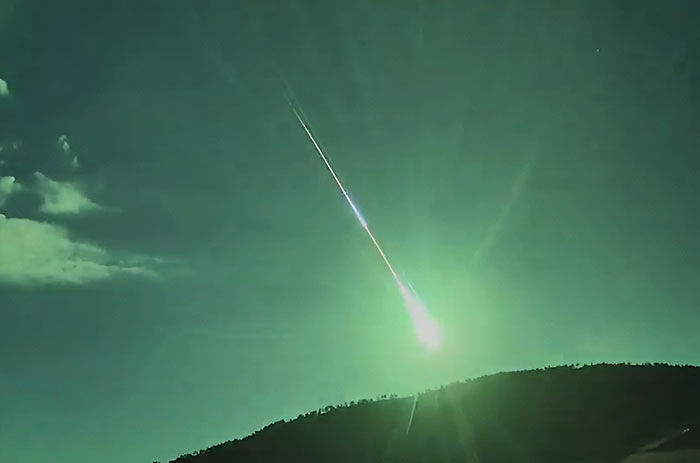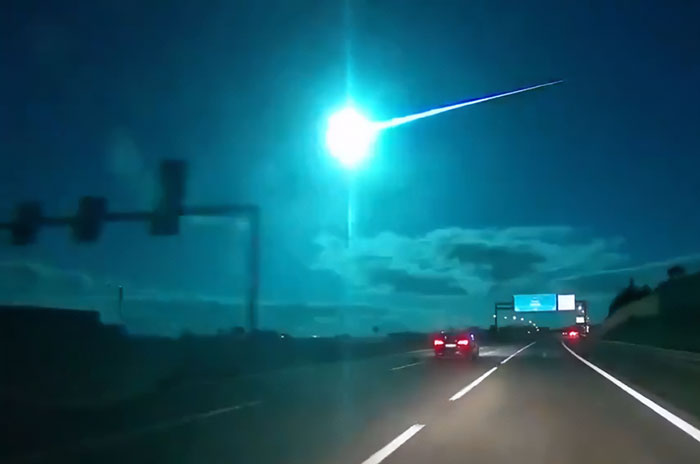The dark night sky over Spain and Portugal lit up for a few moments with a mesmerizing flash of light, captivating the internet and leaving many in awe.
Residents of the western Spanish city of Caceres, which lies near the Portuguese border, felt like they were on the set of a sci-fi movie for a few seconds when the sky lit up with streaks of blue, green, and white on Saturday at around 11:46 p.m. Portugal time.
The sky over Spain and Portugal lit up with a flash of blue, green, and white on Saturday night

Image credits: esaoperations
“It almost looked like daylight … we all looked back and saw it,” 31-year-old Bernardo Taborda told Reuters.
The Lisbon resident said he was out with his friends when he witnessed the sky turning bright green for a few seconds.
“It felt like a movie, we all looked at each other and we were stunned,” he added. “It was amazing.”
The European Space Agency first described it as a “stunning meteor” and later said it was a “small piece of a comet”
☄️😍 ESA’s fireball camera in Cáceres, Spain, spotted this stunning meteor last night!
Our Planetary Defence Office are currently analysing the size and trajectory of the object to assess the chance that any material made it to the surface.
Credit: ESA/PDO/AMS82 – AllSky7 pic.twitter.com/gSU4unncQW
— ESA Operations (@esaoperations) May 19, 2024
The European Space Agency (ESA) shared a clip of the incident and initially said their “fireball camera” spotted a “stunning meteor.”
“ESA’s fireball camera in Cáceres, Spain, spotted this stunning meteor last night!” the space agency said. “Our Planetary Defence Office are currently analysing the size and trajectory of the object to assess the chance that any material made it to the surface.”
The comet fragment traveled at a speed of 28 miles (45 km) per second and burned up over the Atlantic Ocean
O meteorito na tuga pic.twitter.com/4ZxJ50ZFIo
— мила владимировна ♠️ (@milarefacho) May 19, 2024
The ESA later gave an update about the “fireball” and said that it was a “small piece of a comet” that zipped through the sky at a speed of 28 miles (45 km) per second before burning up over the Atlantic Ocean.
“Fireball update! It appears that this object was a small piece of a comet,” the space agency said.
At around 11:46 p.m. in Portugal, many saw the small comet fragment zipping through the sky

Image credits: angelitacodm
“We estimate that it flew over Spain and Portugal travelling at ~45 km/s before burning up over the Atlantic Ocean at an altitude of ~60 km,” ESA added. “The likelihood of any meteorites being found is very low.”
Social media lit up with videos and jaw-dropping reactions after the sky put on a stunning show.
“Wow, that’s a bright one! Fireball camera earning its keep there,” said one comment, while another chimed in, “Amazing capture! Excited to see the results. Planetary defence is vital for our safety and progress. Thank you, ESA!”
“Amazing capture!” the internet said as people shared their jaw-dropping reactions online
☄️ Watch: Blue meteor fireball lights up Europe’s skies
Astronomers say the light-blue shooting star, seen from Andalusia and Brittany, was originally part of an icy comet
Find out more: https://t.co/rtPE4eK6Me pic.twitter.com/MT6BW0IKED
— The Telegraph (@Telegraph) May 19, 2024
Comments giving off aliens-are-here vibes also came out, with one saying, “Alright now THIS version looks like an alien arrival,” while another wrote, “Finally they are here!”
“I’d totally use that as the opening scene for an Alien Invasion movie! So cool,” said one comment.
Another wrote, “Almost biblical.”
Meg Schwamb, a planetary astronomer at Queen’s University Belfast, explained that it is common for comets to create shooting stars before burning up completely when they enter the Earth’s atmosphere due to a combination of high speed, friction, and heat.
“I’d totally use that as the opening scene for an Alien Invasion movie! So cool,” said one comment
WATCH: Mysterious blue fireball lights up the night sky in Spain as spectacular sight goes viral. pic.twitter.com/I9CwCqe1xr
— Fox News (@FoxNews) May 19, 2024
“It’s an unexpected interplanetary fireworks show,” Meg told the New York Times.
“We have notable meteor showers throughout the year, which are the result of the Earth crossing debris clouds of specific comets,” the planetary astronomer added.
Some people online called it a “once in a lifetime moment”


















 English (US) ·
English (US) ·